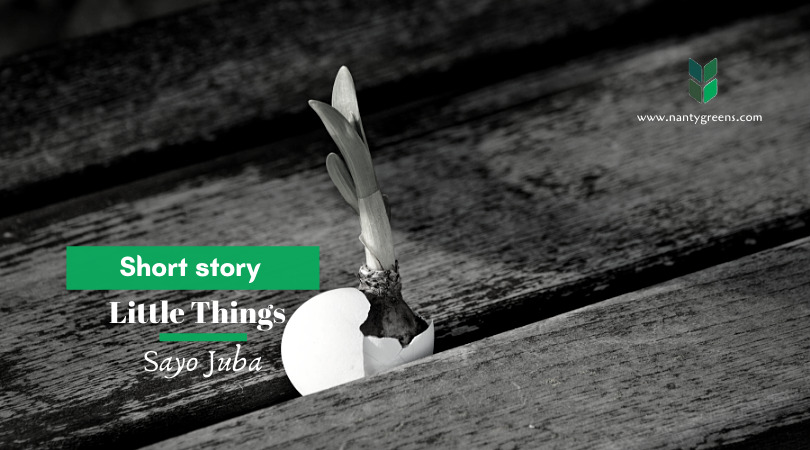
“But she’s not that kind of girl,” she screamed with her hands on her chest, her heart racing as a trickle of sweat ran down her neck.
She was right. Chinyere was not the kind of girl anyone would think of as getting pregnant at such an early age, she was thirteen. Oftentimes when Lola visited the shop, she was either on the chair behind the counter lost in her books, cracking jokes with customers, or expressing her beautiful soul with her perfectly shaped lips. She was the kind of girl who would stand up on her seat for customers to sit, and volunteer to open the window for tired buyers on days when her fingers ached in the bracing weather. Sometimes, she’d offer cold bottled water in the fridge to customers for free with a bright smile and pay with her salary. Lola could even remember the day she sang her a Westlife song, her bad lyrics made Lola laugh so loud, but it was a peal of laughter she needed at that time, it was one of those days when she came back from her numerous but fruitless job interviews.
“She say she get belle for Kamil,” Mama Bobo said, the tears on her cheeks now flowing like a river. She talked about it as her last resort which was a futile attempt to hide her teary eyes. She stood behind the counter, facing Lola who was already reaching for tissues in her bag. Mama Bobo’s eyes gazed blankly at the blue pack of orbit chewing gum on the counter, which was Chinyere’s favourite, while Lola sniffed her nose and shook her head in disbelief. A fly flew into the shop and Mama Bobo reached for the broom at her feet to chase it, she was swinging with the fly clumsily, her left arm moving laboriously at the work. Lola gave a mild grin and wiped her nose.
“Na Kamil she get belle for o” Mama Bobo said again, in a bid to re-introduce the topic after wrestling with the fly for what appears to be about half an hour while placing the now scattered broom together.
“Kamil again!” Lola exclaimed.
Kamil was a vulcaniser in the next street, and three other girls had accused him of impregnating them, all in one month. One of the girls was even the daughter of the street Chairman, rumour has it that the Chairman put Kamil behind bars for three days before he bribed his way out the cell.
“Yes o, me sef shock. I don send her back to her village sha”
“Girls of nowadays” Lola sighed.
“I bin no get anyone to work for me again sha if you see person, abeg let me know”
“I fit do am” Lola uttered without giving it much thought.
“You na alakada now” Mama Bobo replied with a big smile.
“How much you dey pay”
“Na ten thousand naira per month o”
“I fit do am,” Lola said firmly.
That was how Lola found herself working as Mama Bobo’s salesgirl. It’s been two years, two years of smiling at customers who asked for the price of every single item on the shelf without buying any, two years of cursing those kinds of customers under her breath, of counting naira notes over and over again to avoid silly mistakes, of laughing at young boys who were shy to say they came to buy condoms, of selling sweet five times a day to the three-year-olds who entered the shop in a hurry, even though she wished she could sell them more healthy food like the packet of unsalted potato chips that was about to expire on the shelf. It’s been two years of managing to get by.
Flinging her monthly rent in the face of her landlord, who asked her to bring six sureties for a one-bedroom apartment, after learning she works as a salesgirl in Mama Bobo’s shop was the only benefit she got from working there. She was well aware that working there meant that she would have to avoid her old school mates, she wouldn’t want them to know she ended up as a sales attendant in a small shop in Oshodi, and now, on a bright Tuesday morning, Mama Bobo walked into the shop downcast, to inform her that she no longer needed her services. She was closing the shop down as she was no longer making profits. “Market no dey, I dey close down,” She said while facing the door to avoid making eye contact with Lola, she herself was battling tears in her eyes.
Lola knew the Corona Virus was affecting everyone, the streets were empty, people would rather wave at you from the other end of the road than talk to you, even the mechanic at the back of the shop who claimed there was nothing like Corona Virus, with whom Lola had an intense argument in the first week of the virus had stopped coming in the afternoon to buy bread and Fanta, the young boys who sagged their dirty-looking jeans and paraded the street with secondary school girls had reduced their escapades, the children in the face-me-i-face-you house opposite the shop had stopped coming to yell “I want to buy biscuit and pongila” but somehow she was hoping for a miracle.
As Mama Bobo finished her words, Lola slowly put her legs in her sandal, one after the other, grabbed her bag, and quietly headed out of the shop. As she walked, she reached for the edge of her blouse to wipe tears, she walked towards the uncompleted building at the back of St. Peter’s Anglican church, sat on a cement block inside and cried. The tears reminded her of how a few years back she would lock herself in her room and cry when she was still with her parents. How she would weep with her lips held together in the middle of the night, how she would bite her lips so hard, how it didn’t even hurt her, biting her lips didn’t hurt at all, it was living like a ghost; unseen, unheard, in the world, she thought she would dominate that hurt her the most.
One more time, the days she didn’t want to remember were back. So, at that moment, inside the building, she decided she’d had enough, she was going to end it all, she would jump off the Third Mainland Bridge. She was fed up, losing her job was the highest she could take. To her, life was just so unfair. She had tried everything she could, but her life seemed to be hitting rock bottom so fast. Her friend’s lives were perfect, so she thought. They had well-paying jobs, husbands that love them, and children they adore. Some were even rich enough to afford luxury vacations abroad. The day she got the job at Mama Bobo’s shop, she knew that wasn’t where she wanted herself, but at least it was a job.
A few years back, if you asked her where she saw herself in two- or three-year’s time, she would never have imagined herself behind Mama Bobo’s counter. She, a university graduate with a first-class degree. She had dreams of taking over, of working as an economist in one of those big Lagos offices, showing off in high heels and tight-fitting suits, but that dream crashed as soon as it started. She walked in the Lagos sun for years, submitting C. Vs and sitting straight with her legs well placed at interviews which yielded no result. At first, she applied to banks, later she moved to corporate organisations, then later to private companies, and finally to privately-owned primary schools, everything came back negative.
After crying to her heart’s content, she stood up, cleaned the dust off her jeans, readjusted her headscarf, and stepped out of the building. She moved slowly towards Banjoko Street and flagged down the only yellow cab that was passing by. On a normal day, she would have opted for one of those yellow and black “Molue” buses, but it was the day she was going to die, so boarding a taxi wouldn’t be that bad.
An old rusty yellow taxi stopped beside her; the taxi made quirky sounds that suggested it’s been on the road for longer than it should be. She would have preferred a better-looking taxi, but she didn’t have the luxury of time to wait for another yellow cab, so she made do with the one in front of her.
She tilted her head forward to talk to the driver:
“Third mainland bridge”
“Third mainland bridge?” the driver, a man of about fifty years with a round face, and three incision lines drawn on each side of his cheeks asked with his mouth widely opened.
“Yes, third mainland bridge!” Said Lola stiffly.
The taxi driver paused for a few seconds, lost for words, but quickly tried to cover it by readjusting his kufi, tilted a little to the back, and opened the back door, all the while focusing his eyes on Lola, one would know he had so many questions. Lola stepped in, placed her bag gently on the seat, and slanted her head to the back, staring blankly at the dirty roof of the car. She instructed the driver not to take in any more passengers so she could have enough space, it was one of her last few moments anyway, so why would she want to spend it in a cramped taxi.
About thirty minutes into the journey, the taxi driver raised the last piece of boli on the chair beside him and pointed it at Lola.
“Why are you giving me your last boli,” asked Lola with irritation.
“Because you dey cry” replied the driver, who was gulping down a sachet of water as he spoke.
This time, Lola noticed his heavy Oyo accent, his white cap, and his subtle claps and taps as he danced to the Ebenezer Obey song playing on the radio. It drew her interest to him, so she decided to pay more attention. She watched as he increased the song to the highest volume with just one hand, while the other hand grabbed the steering. Before that time, Lola didn’t even know she knew the song that was playing: “a i m’asiko l’on damu eda o, oro mi lowo oluwa lowa o” She joined in singing with the driver.
At that moment Lola began to wonder how the driver could be so happy and content with his life as the driver of a shabby taxi, he did it with so much grace and elegance. On the left side of the dashboard was an old, dirty, and dusty university calendar that Lola had just noticed was there.
“Do you collect university calendars?” Lola asked.
“Ah, na my school be that o”
This made Lola readjust on the chair, she sat straight, and placed her hands on her lips. The taxi driver saw the shock on her face, gave a subtle smile, and decided to speak further:
“I go school o, but I lost my job twenty years ago since then I’ve been managing this taxi.”
He further added: “As long as there is life, there is hope”
The conversation gave way for a few minutes of awkward silence, as Lola sat just looking at the driver, the driver didn’t know what else to do so he decided to speak again.
“Third mainland bridge, abi where you say you dey go?”
It took Lola about thirty seconds to find the perfect response, after carefully thinking about what to say, she replied:
“No, take me back to Banjoko street. I want to go and see my parents; it’s been a long time since I saw them” she said with a wide grin on her face.
The taxi driver gave a wide and content smile, made a sharp turn, and headed back to Oshodi.
She knew it had been months since she last visited her parents, she knew spending time with them would mean answering questions like: “when will you get married?”, “where is your husband?”, “Is it that you can’t get any decent job in Lagos or you are just being lazy?” She was sure her father would remind her of how at her age, he was already paying for his master’s degree in New York. She knew her mother would say: “me o, I was not a self-funded master’s student in New York at thirty-two, but I was already a wife and a mother.” but she would go anyway, now she had a reason to, she had an answer to their questions. Her answer to whatever question they ask would be: “as long as there is life, there is hope.”

Sayo Juba is a graduate of the BBC World Service Trust Workshop (Now BBC Media House). She was also a runner-up in a 2016 Flash Fiction organised by Words Are Work; her story titled “Red” earned her the spot.
Her work has been featured on Mbari Magazine and IdeasLane Africa.
Her play about women was broadcasted on national radio in Nigeria. More of her work can be seen on www.sayojuba.com
social media : Instagram @sayofunmi_

